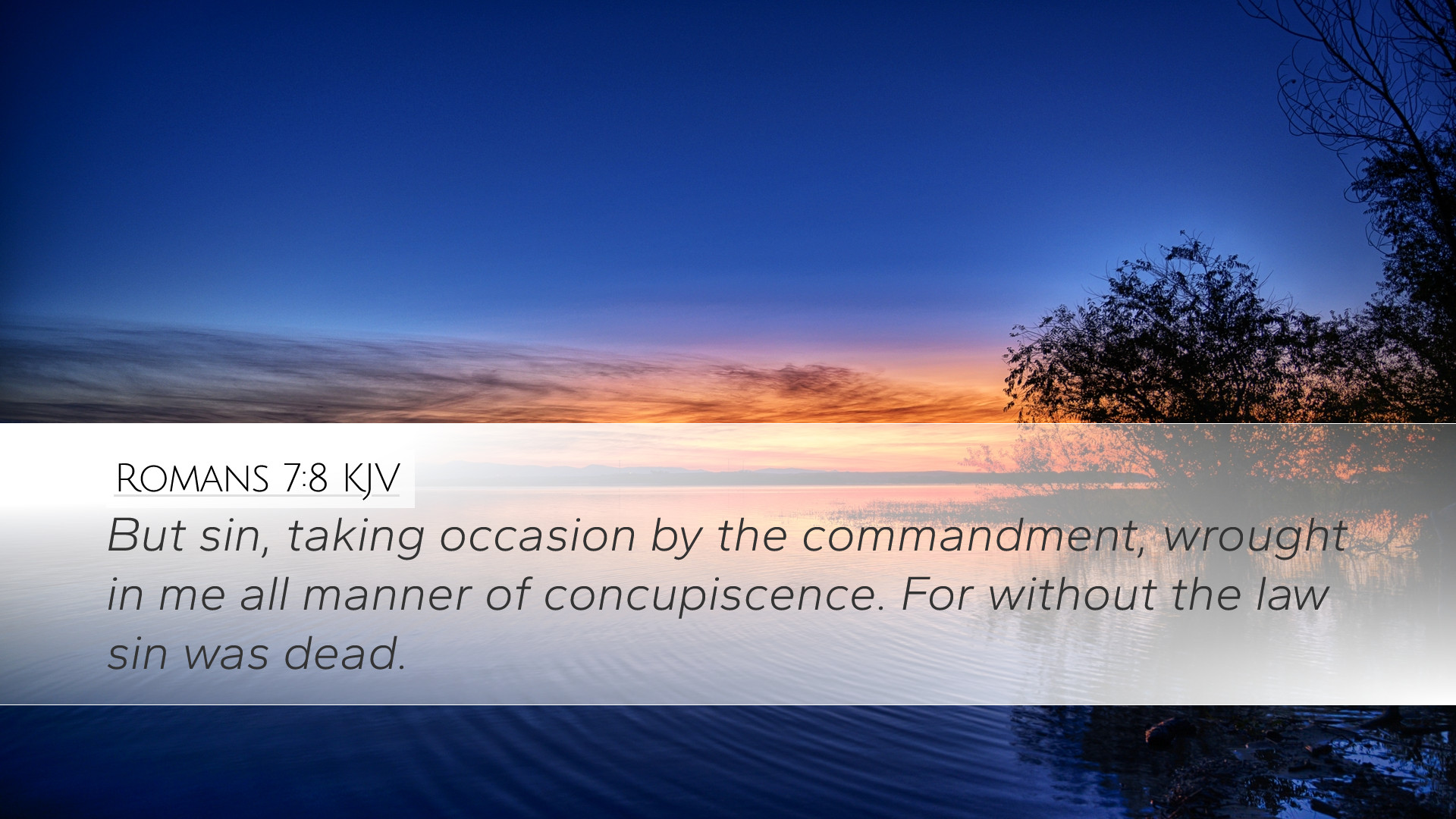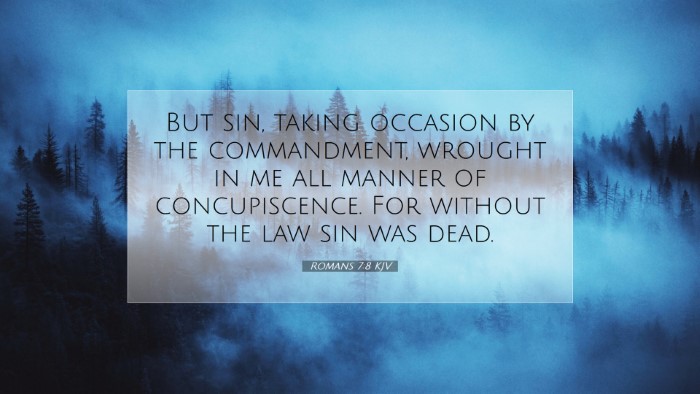Old Testament
Genesis Exodus Leviticus Numbers Deuteronomy Joshua Judges Ruth 1 Samuel 2 Samuel 1 Kings 2 Kings 1 Chronicles 2 Chronicles Ezra Nehemiah Esther Job Psalms Proverbs Ecclesiastes Song of Solomon Isaiah Jeremiah Lamentations Ezekiel Daniel Hosea Joel Amos Obadiah Jonah Micah Nahum Habakkuk Zephaniah Haggai Zechariah MalachiRomans 7:8
Romans 7:8 KJV
But sin, taking occasion by the commandment, wrought in me all manner of concupiscence. For without the law sin was dead.
Romans 7:8 Bible Commentary
Commentary on Romans 7:8
Verse Context: Romans 7:8 reads: "But sin, taking occasion by the commandment, wrought in me all manner of concupiscence. For without the law sin was dead." This verse is pivotal in understanding the Apostle Paul’s theological exposition on the law and sin in the life of believers.
Overview of the Verse
The Apostle Paul, in this chapter, explores the relationship between the law and sin, portraying how the commandment serves as a catalyst for sin rather than a means to obtain righteousness. This passage illustrates the struggle with sin that every believer faces.
Insights from Matthew Henry
Matthew Henry emphasizes that sin is inherently perverse and takes advantage of the law to provoke sinful desires. He notes that the commandment, which was intended to lead to life and holiness, instead inflames the sinful nature in a believer. Henry states:
"The law, while it commands what is good, provokes men to that which is evil."
He highlights that the knowledge of the law brings awareness to sin, which, when aroused, leads to various sinful desires. This indicates the profound impact the law has on human nature, leading to internal conflict.
Insights from Albert Barnes
Albert Barnes elucidates the idea that the fundamental problem lies not in the law itself, but in the sinful nature of humanity. Barnes explains that sin is more active and potent when the law is present to define it:
"The more explicit the commandment, the more it renders the violation of that commandment sinful."
He references personal struggle, stating that the law illuminates the requirement for holiness, but also highlights the inability of humanity to fulfill such requirements due to the flesh's weakness. This leads to a feeling of frustration and a recognition of true need for grace.
Insights from Adam Clarke
Adam Clarke offers a deeper examination by discussing the concept of "concupiscence" (inordinate desires), emphasizing its connection with the law. He states that:
"Concupiscence is the sinful drive that exists independently of the commandment but is awakened in the presence of the law."
Clarke posits that the presence of law serves as a mirror revealing the depth of human depravity. His commentary underscores the notion that while the law is holy, it cannot justify; instead, it exposes sin. He links this to the necessity of grace through faith in Jesus Christ for salvation and sanctification.
Theological Implications
The combination of insights from Henry, Barnes, and Clarke yields a rich theological tapestry regarding the nature of sin and the limitations of the law:
- The Law as Revealer: The law's primary purpose is to reveal human sinfulness and inability to achieve righteousness on one’s own.
- The Activation of Sin: Sin takes advantage of the law, highlighting the struggle believers face when trying to live according to its standards.
- Need for Grace: The individual's inability to adhere to the law points to the necessity of grace found through faith in Christ.
Practical Application for Believers
Believers are encouraged to recognize the power of sin in light of the law and to rely on the grace of God to overcome sin's hold. The following applications can be drawn:
- Awareness of Sin: Understanding that knowledge of the law is essential for recognizing personal sinfulness.
- Reliance on Grace: Emphasizing the need for daily reliance on grace to combat sinful desires.
- Transformation through the Spirit: The Holy Spirit empowers believers to fulfill the righteous requirements of the law, leading to holy living.
Conclusion
In Romans 7:8, the Apostle Paul articulates the complex dynamics between sin, the law, and the believer. The commentaries from public domain scholars provide profound insights that enhance understanding. This verse serves as a crucial reminder of humanity’s need for grace and the ongoing struggle believers face against sin, prompting reflection on the sufficiency of Christ's sacrifice and the transformative work of the Holy Spirit.


